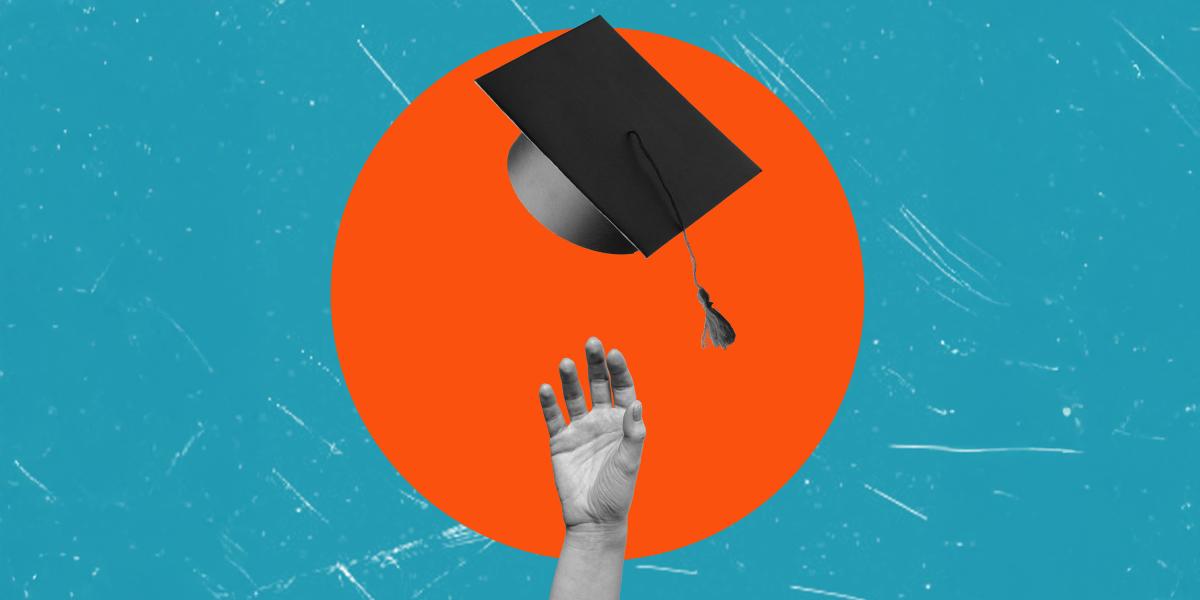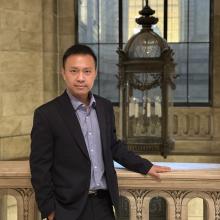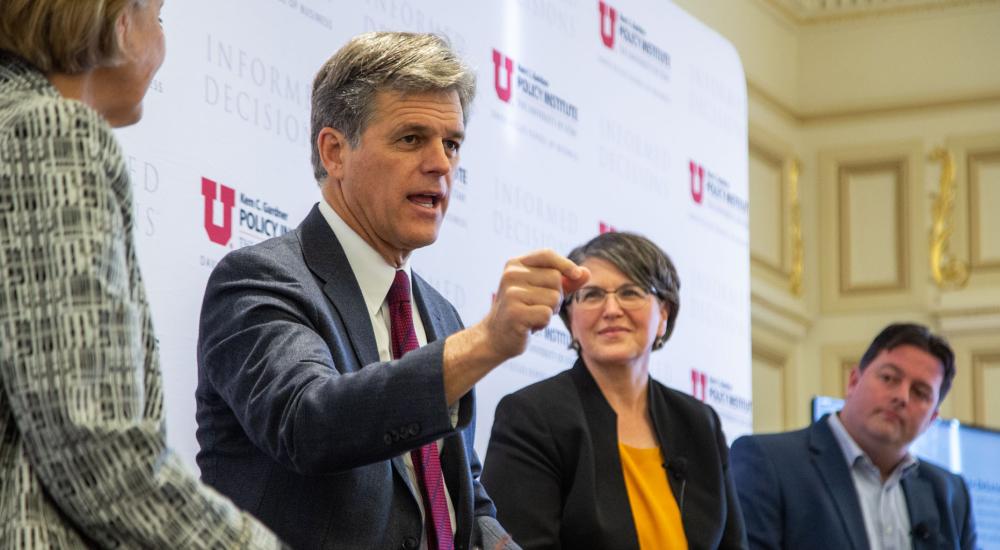Kyaw Moe Tun: Education as Resistance

When Kyaw Moe Tun earned his PhD in organic chemistry from Yale University in 2014, he returned to his home country of Myanmar with a mission: to bring liberal arts education to a nation where rote memorization had dominated classrooms for more than five decades.
That mission became Parami University, the country’s first liberal arts institution. But just as construction was set to begin on Parami's campus in March 2021, Myanmar's military staged a coup, forcing the university to completely reimagine its future.
Rather than abandon the project, Kyaw Moe Tun and his team registered Parami as a nonprofit online university in Washington, D.C., established a dual-degree partnership with Bard College, and continued serving Myanmar students from abroad.
In this interview, Kyaw Moe Tun—who was a plenary speaker at the 2025 NAFSA Annual Conference & Expo—discusses how personal experience shaped his educational philosophy, why critical thinking represents resistance, and how international partnerships have enabled Parami to survive through one of the most turbulent periods in Myanmar's modern history.
What inspired you to bring liberal arts education to Myanmar, and how does Parami's mission address the specific educational needs of Myanmar's youth?
It was my experience at Bard College (Bard) at Simon's Rock in Massachusetts, where professors asked me questions like, "What do you think about this issue?" Back in Myanmar, teachers never asked what I thought. They told me what to know and how to think. I was required to memorize [concepts] verbatim from textbooks and look at issues from a narrow perspective.
At Bard, everything changed. My opinions were valued, and my curiosity could roam freely. I knew how powerful liberal arts education would be for Myanmar students, whose only approach was rote memorization for more than five decades. I had to bring this kind of education to help Myanmar youth become who they want to be and to shape our country's future.
Your journey from earning a PhD in organic chemistry at Yale to founding a university is quite remarkable. What pivotal moments or experiences led you to shift from science to educational entrepreneurship?
There is no single moment in this journey from a PhD in organic chemistry to founding a university. Many moving pieces fell into place to make it happen, but I would say there were two main pieces that reinforced each other.
First was Bard's work in Myanmar. Ba Win, a late mentor of mine, was a longtime leader of Bard College at Simon's Rock. Born in Myanmar, Ba Win came to the United States at age 18 to study at Kalamazoo College and then went on to get his graduate degree at Johns Hopkins University. He became part of the senior leadership of Bard College at Simon's Rock for more than 40 years. In fact, it was because of Ba Win that I won a full-ride scholarship to study at Bard College at Simon's Rock.
In 2009 and 2010, when I was still in my PhD program, he led efforts to establish a Bard branch campus in Myanmar. He asked me to come back to Myanmar once I was done with my PhD to become one of the founding science faculty members. I agreed to do so. However, in 2012, Ba Win told me that the project faced many roadblocks, and he needed to put a permanent pause on it. I always like to joke that I was fired from the job that I never had. I was, of course, extremely frustrated. So, I decided to go back to Myanmar after I finished my PhD in 2014.
Going back to Myanmar was an easy decision. My father wrote and mailed many letters to me from Myanmar during my college years, all the way through my time at Yale. In those letters, he asked me to use my privilege to share my education with others in Myanmar. He repeatedly asked me to think about ways to benefit humanity, and it stuck with me. After I finished my PhD, I decided that I had focused on myself enough in terms of educational attainment, and it was time for me to focus on helping others.
In [my father's] letters, he asked me to use my privilege to share my education with others in Myanmar. He repeatedly asked me to think about ways to benefit humanity, and it stuck with me.
The timing couldn't have been better. Myanmar, after being ruled under an iron-clad military dictatorship, started to open up in 2010, with the installation of a pseudo-civilian government. With the reforms since 2010, I felt that I could contribute to national reforms, particularly in education. So, I decided to take my father's advice and I went back to Myanmar.
With the path paved by Bard and with my father's advice—and advice from a few other mentors of mine—I took on the challenge of establishing a liberal arts college in Myanmar. It started in 2017 as a post-graduate certificate school called Parami Institute that offered semester-long liberal arts and sciences diploma programs to graduates from Myanmar public universities.
How did the 2021 military coup impact Parami's operations and student community, and what strategies did you develop to continue providing education during this unprecedented crisis?
We had raised approximately $4 million USD to start building our campus in March 2021 to welcome the inaugural class in fall 2022. The coup disrupted everything, and we had to postpone construction indefinitely.
Our initial response was ensuring student and staff safety, then assessing what we could do as a civic actor. After the coup, hundreds of thousands of students dropped out in resistance to military-controlled education and joined the civil disobedience movement. In response, the military raided houses, terrorized communities, and detained protest organizers. What we had done during the COVID-19 pandemic became very handy—continuing classes on Zoom. For almost half a year, it was a waiting game to see where the country was headed.
The decision to register Parami in Washington, D.C., in 2022 was clearly strategic. How has this legal repositioning, combined with the Bard partnership, allowed you to maintain academic freedom and continue serving Myanmar students while operating as a U.S. institution?
It became apparent that military control wouldn't be short-lived. We needed proper legal structures to operate as a degree-granting institution, especially since millions of students had left the public education system and were at risk of losing access to educational opportunities.
To defend intellectual space, we believed liberal arts and sciences education that encouraged critical thinking was the best form of resistance.
I convinced Parami’s Board to identify a favorable jurisdiction to incorporate Parami and offer undergraduate programs relevant to young people's aspirations. This was crucial when the Myanmar military was suppressing dissent and academic freedom. To defend intellectual space, we believed liberal arts and sciences education that encouraged critical thinking was the best form of resistance.
We incorporated in Washington, D.C., and were licensed to offer degrees by the Higher Education Licensure Commission (HELC) in June 2022. We enrolled our first class of 57 students that August. The launch succeeded because of our dual-degree partnership with Bard, which offers students fully accredited degrees while Parami pursues its own accreditation.
You've mentioned wanting students to develop "a sustained sense of doubt on any issue" and see problems from multiple perspectives. How does this liberal arts approach differ from traditional educational models in Myanmar?
Our traditional learning in Myanmar focused on strict rote memorization. In high school, I could recite the eleventh-grade biology textbook word per word, including figure captions, in 45 minutes. On exams, we were forced to write entire paragraphs from the textbook without changing words. Paraphrasing was penalized. I describe this as state-sanctioned nationwide plagiarism.
With this approach from basic education through higher education, young people aren't taught to think on their own but to listen to authorities. The Myanmar authorities call this "obedience." This isn't a recipe for growth—it's an ingredient desired by authoritarian governments. It's not surprising that liberal arts education, which encourages critical thinking and questioning authorities, is disliked by dictatorial governments.
With nearly 150 alumni from your programs, what evidence do you see of Parami's impact on Myanmar's civil society and leadership landscape?
Parami is still very young—not even ten years old from when Parami Institute was established in 2017. Yet, alumni are working in leadership positions across civil society organizations. One leads a network of nonprofit post-secondary, community-based educational institutions in Myanmar. Several lead research projects in think tanks conducting crosscutting social research in governance and policy. Some are pursuing doctoral degrees.
Even current undergraduate students are actively engaged in civic projects, working in organizations ranging from mental health counseling to environmental protection, education, and community development.
Tell us about the significance of Parami’s dual-degree partnership with Bard that received final approval from the Middle States Commission on Higher Education in 2023.
The partnership is mutually beneficial. Bard is driven by its social mission in civic engagement and believes it needs to empower students disadvantaged by political turmoil, displacement, and civil war. As a recently established institution, Parami needs support to ensure our programs are high quality and have credibility.
From Bard's standpoint, all Parami students are Bard students. All Parami classes bear Bard credits. All Parami faculty are approved by the Bard College Faculty Exchange and Oversight Committee. After completing graduation requirements, Parami students receive identical Bard diplomas issued to Bard students in New York. This gives tremendous credibility and legitimacy to Parami when recruiting students.
Beyond the Bard partnership, Parami is also part of the Open Society University Network (OSUN). How does being part of this network enhance Parami's mission?
OSUN gives tremendous global exposure to Parami students in Myanmar. Without it, students stuck in Myanmar would feel isolated from the rest of the world. Activity programs bring together students from nearly 50 academic institutions worldwide, providing a platform to develop lifelong friendships and camaraderie.
Some activities are in person conferences and workshops. Our students have attended OSUN-organized activities in Austria, Colombia, Germany, Hungary, Kenya, and the United States—in addition to Parami-sponsored programs in Myanmar, Taiwan, Thailand, and the United States—enriching student life at Parami.
I envision fluid credit transfers between our institutions and co-creation of exchange programs allowing better student mobility.
Bard has committed to supporting 425 refugee and displaced students over the next four years through partnerships including Parami . How do these institutional partnerships enable Parami to scale its impact?
Bard is creating Bard Global Degree programs, and students in refugee and displacement contexts worldwide can take online classes through programming we develop and co-create with partners like Parami. This will benefit Parami students tremendously, opening doors beyond what's available at Parami. It enables us to foster direct relationships with institutions already working with Bard. I envision fluid credit transfers between our institutions and co-creation of exchange programs allowing better student mobility.
Looking ahead, what are your long-term goals for Parami, particularly regarding accreditation, campus development, and expanding access to liberal arts education?
The situation in Myanmar is highly fluid and unstable, with China and Russia backing the Myanmar military. The military is eyeing an election perhaps as an exit strategy, though it's expected to be rigged and far from free and fair.
For Parami, we'll maintain our institutional license from the HELC for the next several years, and we'll pursue accreditation from an institutional accreditor in the next two years. Based on what's possible in Myanmar in the next five years, we'll reassess the possibility of building a physical campus. Having a physical campus is an important milestone, yet I believe having quality online degree programs is also very important for fulfilling the promise of accessible education for students in Myanmar and the region. •
About International Educator
International Educator is NAFSA’s flagship publication and has been published continually since 1990. As a record of the association and the field of international education, IE includes articles on a variety of topics, trends, and issues facing NAFSA members and their work.
From in-depth features to interviews with thought leaders and columns tailored to NAFSA’s knowledge communities, IE provides must-read context and analysis to those working around the globe to advance international education and exchange.
About NAFSA
NAFSA: Association of International Educators is the world's largest nonprofit association dedicated to international education and exchange. NAFSA serves the needs of more than 10,000 members and international educators worldwide at more than 3,500 institutions, in over 150 countries.
NAFSA membership provides you with unmatched access to best-in-class programs, critical updates, and resources to professionalize your practice. Members gain unrivaled opportunities to partner with experienced international education leaders.















